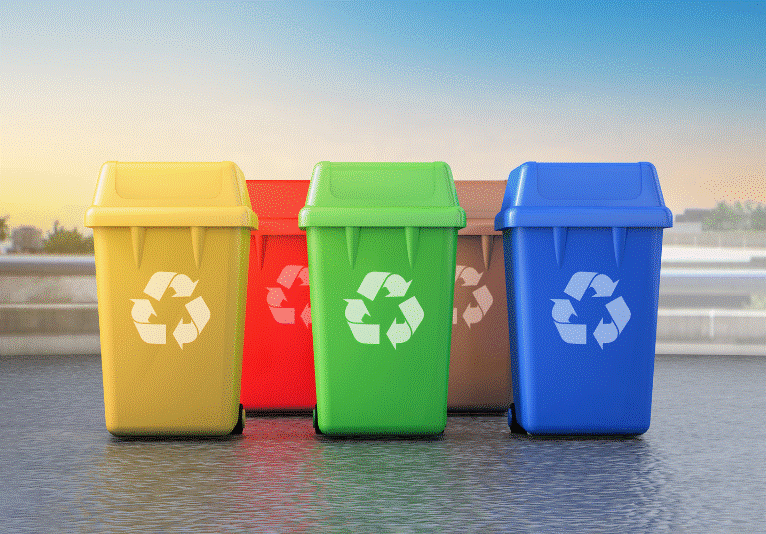Our homes today create a huge amount of trash. This trash includes food waste, packaging, old electronics, etc. All this household waste causes major problems for the environment. It fills up landfills, creates greenhouse gasses, and pollutes the soil and water. The traditional ways of dealing with trash are expensive, unhealthy, and inefficient.
Modern homes need new, innovative solutions to manage waste better. New technologies can make collecting trash easier, allow us to monitor how much waste we create, and increase recycling. Adopting these innovative waste management solutions will reduce our homes' negative impact on the environment and make disposing of trash more cost-effective. Here are some of the most significant new technologies popping up that you should know about.
Smart Waste Bins
Smart bins revolutionize waste management for homes. Instead of sorting items yourself, the bin uses AI technology to recognize different materials as you throw them in automatically. It can identify plastics, papers, glasses, and metals and then separate them into divided sections inside. The bins also crush everything down to make more room as they fill up. They track their own fill levels and alert your waste management service when nearly full, so you don't have to remember. With smart bins doing the work, recycling is much simpler.
Waste Level Sensors
For more efficient waste management, some companies install sensors in outdoor bins to monitor how full or empty they are. The sensors measure the actual fill levels and beam that data to the waste management company in real-time. This way, instead of trucks coming on a fixed schedule, they only make trips when the sensors show bins need emptying. It eliminates unnecessary trips, cutting back on fuel usage and emissions from the truck fleet.
Recycling Robots
Recycling facilities utilize advanced robots to sort materials rapidly, improving waste management. Using artificial intelligence, these robots can identify every different type of item with supreme accuracy—plastics, papers, glasses, metals, and more. They separate it all at lightning speeds that human workers can't match. Best of all, the robots can work 24/7 without breaks, processing much higher volumes of recyclables.
Garbage Truck Weighing Mechanisms
The newest garbage trucks are equipped with built-in scales that constantly weigh everything that gets emptied, enhancing waste management operations. As the automated arm lifts and dumps each residential bin, the scales measure the exact weight added to the truck. Waste management companies analyze this weight data using computer programs to predict when bins will reach capacity in different neighborhoods. This insight allows them to plan the most efficient trash pickup routes, only sending trucks to full bins.
Pneumatic Waste Systems
Some densely populated cities have constructed underground pneumatic waste systems to transport trash more efficiently. Instead of noisy, exhaust-spewing garbage trucks driving every street, residents simply toss their trash into special vacuum intake valves. The waste gets sucked through an underground pipe network and carried to processing facilities. This modern system cuts down on truck traffic, noise, and air pollution in crowded urban areas.
Solar Trash Compactors
These innovative compactors are completely solar-powered and use no traditional electricity. As trash gets tossed in, a hydraulic ram continuously compacts it down into an extremely condensed form. This allows each compactor to hold up to 5 times more waste than a regular bin before getting full. Built-in sensors monitor the actual compressed fill levels and signal for trash pickup at the optimal time when full. By maximizing capacity, neighborhoods require far fewer compactor collections.
E-Waste Kiosks
Electronic devices contain toxic materials that require special waste management. Companies have installed special e-waste kiosks around communities to dispose of e-waste properly. You can drop off obsolete electronics like phones, computers, and TVs at these unmanned kiosks. Some even pay cash on the spot if the device powers on, incentivizing people to recycle e-waste responsibly. Cleaning your home prevents hazardous contaminants from polluting the environment while also allowing you to earn more money from your waste.
Recycling Apps
New technologies and mobile apps are making it simpler than ever to practice good waste management from home. Many use barcode scanning so you can check if a product or container is recyclable. The apps provide detailed instructions on how to prep items for recycling pickup properly. They also list locations of nearby recycling drop-off centers with guides on what materials each one accepts. Plus, recycling apps give creative tips to reduce your overall household waste.
New technologies are making it easier to deal with trash from our homes in better ways for the environment. Smart bins can automatically sort recyclables for us. Solar compactors and vacuum systems allow less truck traffic and emissions. Special kiosks help properly dispose of old electronics that can be hazardous. Apps give instructions on how to recycle correctly and reduce overall waste. By using these innovative solutions, we can simplify handling household waste, recycle more, rely less on landfills, and do less damage to the planet we live on. Adopting these technologies is an important step towards living in a cleaner, healthier world.





